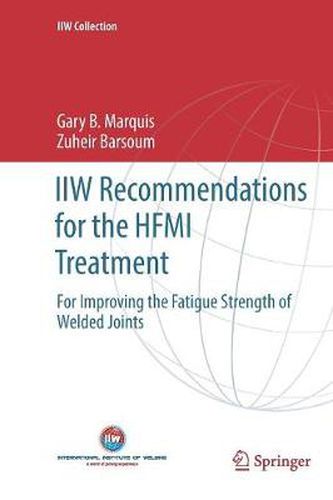Readings Newsletter
Become a Readings Member to make your shopping experience even easier.
Sign in or sign up for free!
You’re not far away from qualifying for FREE standard shipping within Australia
You’ve qualified for FREE standard shipping within Australia
The cart is loading…






This title is printed to order. This book may have been self-published. If so, we cannot guarantee the quality of the content. In the main most books will have gone through the editing process however some may not. We therefore suggest that you be aware of this before ordering this book. If in doubt check either the author or publisher’s details as we are unable to accept any returns unless they are faulty. Please contact us if you have any questions.
This book of recommendations presents an overview of High Frequency Mechanical Impact (HFMI) techniques existing today in the market and their proper procedures, quality assurance measures and documentation. Due to differences in HFMI tools and the wide variety of potential applications, certain details of proper treatments and quantitative quality control measures are presented generally. An example of procedure specification as a quality assurance measure is given in the Appendix.
Moreover, the book presents procedures for the fatigue life assessment of HFMI-improved welded joints based on nominal stress, structural hot spot stress and effective notch stress. It also considers the extra benefit that has been experimentally observed for HFMI-treated high-strength steels.
The recommendations offer proposals on the effect of loading conditions like high mean stress fatigue cycles, variable amplitude loading and large amplitude/low cycle fatigue cycles. Special considerations for low stress concentration welded joints are also given. In order to demonstrate the use of the guideline, the book provides several fatigue assessment examples.
$9.00 standard shipping within Australia
FREE standard shipping within Australia for orders over $100.00
Express & International shipping calculated at checkout
This title is printed to order. This book may have been self-published. If so, we cannot guarantee the quality of the content. In the main most books will have gone through the editing process however some may not. We therefore suggest that you be aware of this before ordering this book. If in doubt check either the author or publisher’s details as we are unable to accept any returns unless they are faulty. Please contact us if you have any questions.
This book of recommendations presents an overview of High Frequency Mechanical Impact (HFMI) techniques existing today in the market and their proper procedures, quality assurance measures and documentation. Due to differences in HFMI tools and the wide variety of potential applications, certain details of proper treatments and quantitative quality control measures are presented generally. An example of procedure specification as a quality assurance measure is given in the Appendix.
Moreover, the book presents procedures for the fatigue life assessment of HFMI-improved welded joints based on nominal stress, structural hot spot stress and effective notch stress. It also considers the extra benefit that has been experimentally observed for HFMI-treated high-strength steels.
The recommendations offer proposals on the effect of loading conditions like high mean stress fatigue cycles, variable amplitude loading and large amplitude/low cycle fatigue cycles. Special considerations for low stress concentration welded joints are also given. In order to demonstrate the use of the guideline, the book provides several fatigue assessment examples.